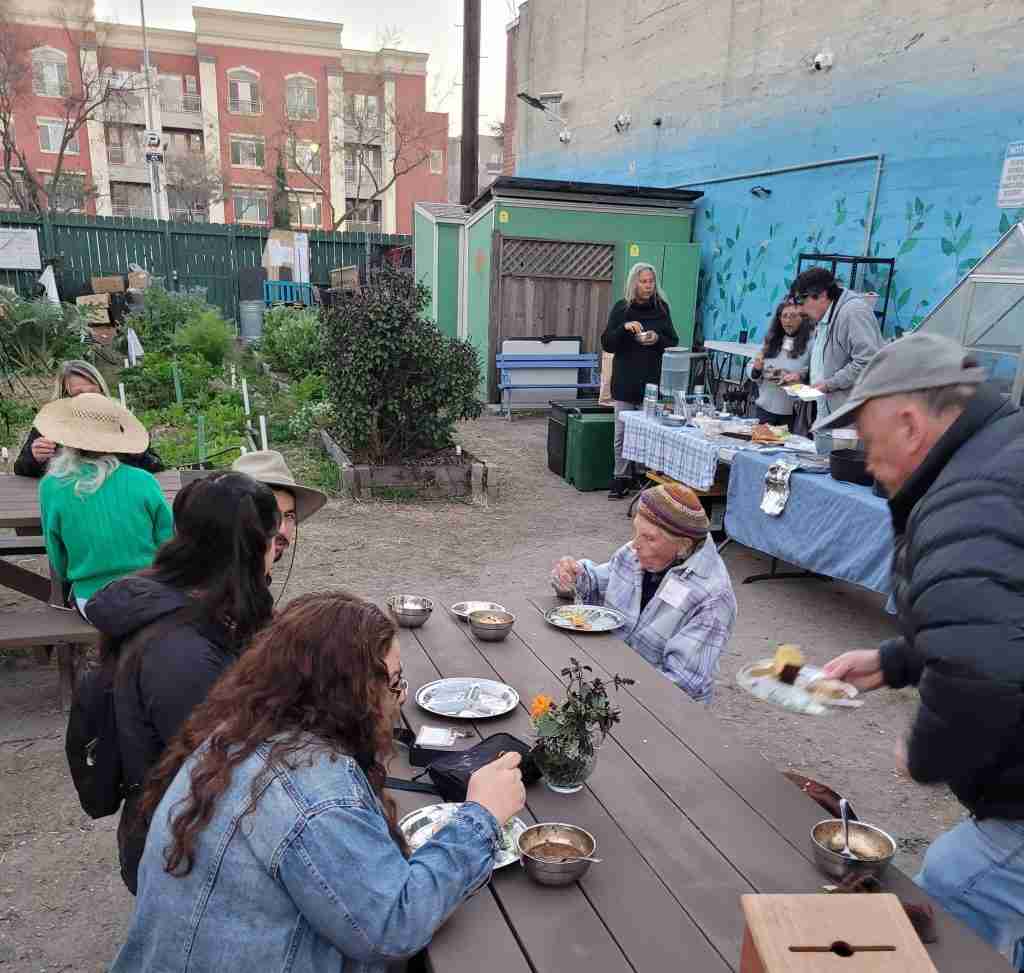Durham, North Carolina
Forget a community garden — why not a community farm? The Farm Church goes big, meeting on the land of an actual farm, serving its community with healthy food. In Durham, 10 percent of residents (and 20 percent across North Carolina) experience food insecurity. The Farm Church redefines traditional worship. Founded in 2016 as a Presbyterian ministry, this unique congregation gathers outdoors, transforming communal gardening into a sacred act of service. There’s no building. The liturgy is spoken and sung outside — rain or shine, heat or cold.
Each Sunday, members come together in work clothes to cultivate the vegetables, which are then harvested and distributed to local organizations addressing hunger in the community. This hands-on approach fosters a deep sense of connection among participants. As one member reflected, “We dismantle the welfare queen myth together,” highlighting the church’s commitment to social justice and collective action. By merging spiritual practice with tangible outreach, The Farm Church shows how faith communities can sow seeds of sustenance and hope in their neighborhoods.
Columbus, Ohio
An unassuming half-acre of land tells a story of generosity, resilience, and unexpected partnerships. This community garden, which produces over 24,000 pounds of fresh vegetables annually, is not just about food — it’s about faith in action.
What makes this garden remarkable is the coalition behind it. A sprawling megachurch, a small evangelical congregation with no land of its own, and a Catholic parishioner with a passion for soil health have come together in the most unlikely alliance. Upper Arlington Lutheran Church provides the land, while the daily operations are led by Irma Chon, a member of a small Christian & Missionary Alliance church, and Todd, a Catholic volunteer who specializes in composting and infrastructure.
“The key to all of this is partnership,” Irma explains. “Our church doesn’t even have a parking lot, let alone land for a garden. But Upper Arlington Lutheran had both the vision and the space. And the Catholic parish had someone who knew how to make the soil come alive. None of us could have done this alone.”
Unlike traditional community gardens with individual plots, this one operates as a single, shared space where anyone — regardless of background — can work and receive food. The produce goes to local food pantries and refugee families, and Irma’s own barn has become a hub for distribution, where relationships grow alongside the vegetables.
“People may not be starving for food,” she says, “but they are starving for relationships.” The garden, in that sense, is more than a source of nourishment — it’s a place of belonging, where faith is planted and cultivated one harvest at a time.

Greenville, North Carolina
Spring Forest Community spans 23 acres, with a dedicated one-acre garden. This monastic, missional community operates under the United Methodist Church, emphasizing a life centered around prayer, work, communal meals, neighborly love, and rest.
At the helm is Elaine A. Heath, the Abbess and lead farmer of Spring Forest. Heath’s journey is a unique fusion of academia and hands-on farming. Having served as Dean of the Divinity School at Duke University and as the McCreless Professor of Evangelism at Perkins School of Theology, she has been a pioneer in the new monastic and missional church movements. Her vision for Spring Forest is clear: “We have built a community around food and prayer.”
This community garden is diverse, encompassing a variety of vegetables, dairy goats, and laying hens. While a portion of the produce supports local Community Supported Agriculture (CSA) programs, the majority is dedicated to aiding refugees resettled in the area — a ministry which has become increasingly vital due to recent federal funding cuts. This commitment reflects Spring Forest’s dedication to serving the marginalized and fostering inclusivity.
Beyond agriculture, Spring Forest offers a range of other ministries, including educational programs, spiritual formation, and community gatherings. Collaborating with various churches, nonprofits, and organizations, the community embodies a holistic approach to faith and service. Heath’s leadership and the community’s collective efforts have cultivated a sanctuary where spirituality and sustainable living coalesce, providing nourishment for both body and soul.
San Pedro, California
The Garden Church reimagines the traditional concept of worship by intertwining spirituality with communal agriculture. Founded in 2014 by Anna Woofenden, the congregation began with a vacant lot and transformed it into an urban sanctuary where people come together to work, worship, and share meals.
The church’s mission is to “Feed and Be Fed.” Rooted in the orthodox Christian tradition and Swedenborgian theology, The Garden Church offers a living experience of encountering God through community engagement, nature, and service. Rev. Woofenden envisioned a space connecting food, earth, community, and spirituality. She reflects, “The Garden Church grew out of my hunger, and my questions about how we reconnect to our food, to the Earth, to each other and to God or a spiritual community.”
Central to the church’s activities are its Sunday gatherings, starting at 3 p.m. with some communal gardening, a worship service at 4:00 p.m., and shared meal at 5 p.m. bringing the day to a delicious conclusion. A rhythm fostering belonging and purpose.
The Garden Church emphasizes inclusivity and community outreach. Through “Feed and Be Fed” initiatives, the church addresses local issues of food insecurity by distributing fresh produce grown onsite to those in need, a holistic approach nourishing the body and feeding the soul.
The Garden Church cultivates a space where spirituality and everyday life converge, inviting all to participate in a sacred act of communal growth and sustenance.





